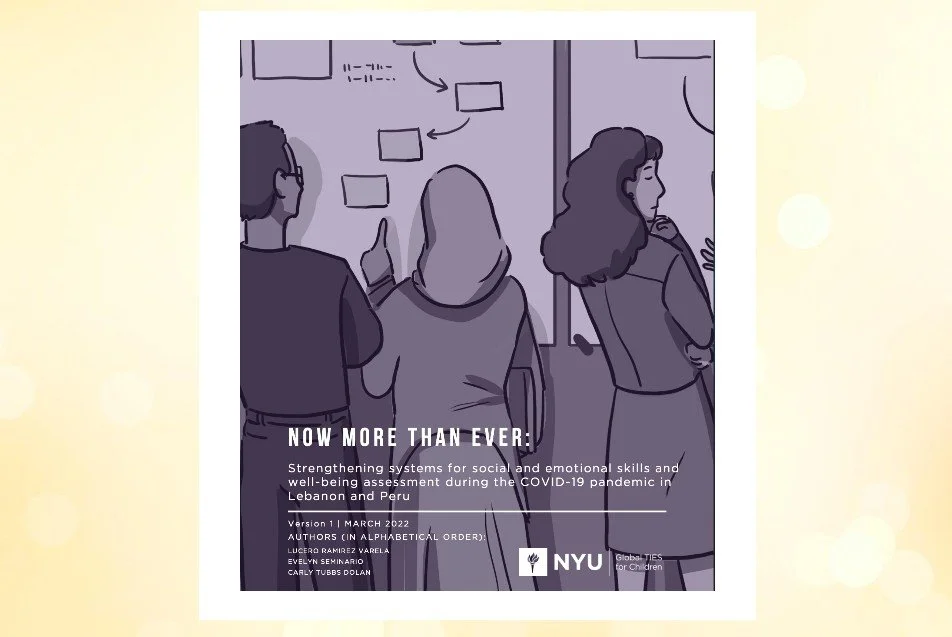Resources
HOLAS Assessment Bank
The Holistic Learning Assessment System (HOLAS) Bank is a curated inventory of educational tools/assessments and relevant monitoring and evaluation (M&E) resources designed for use and/or implemented in Colombia and Peru.
Now More Than Ever: a concept note about our assessment work in Lebanon and Peru
This document outlines the work done by NYU Global TIES to strengthen social and emotional skills and well-being assessment in Lebanon and Peru during the COVID-19 pandemic. It explains the frameworks and concepts, and outlines next steps in those countries.
Fortalecer los sistemas de monitoreo y evaluación de aprendizaje holístico en contextos de emergencia y crisis prolongada: Colombia y Perú
En esta nota conceptual se describen los marcos, conceptos y métodos del proyecto en el que NYU Global TIES for Children (NYU-TIES) y la Universidad de los Andes están trabajando para fortalecer los sistemas de monitoreo y evaluación de aprendizaje holístico en Colombia y Perú (mayores receptores de familias de refugiados y migrantes venezolanos).
Strengthening holistic learning outcome measurement systems in emergencies and protracted crises: Colombia and Peru
This concept note describes the frameworks, concepts and methods of the project in which NYU Global TIES for Children (NYU-TIES) and the Universidad de los Andes are working to strengthen holistic learning monitoring and evaluation systems in Colombia and Peru (main recipients of Venezuelan refugee and migrant families).
Now More Than Ever: Strengthening systems for social and emotional skills and well-being assessment during the COVID-19 pandemic in Lebanon and Peru
This document outlines the work done by NYU Global TIES to strengthen social and emotional skills and well-being assessment in Lebanon and Peru during the COVID-19 pandemic. It explains the frameworks and concepts, and outlines next steps in those countries.
Adaptation and application of the Measuring Early Learning Quality and Outcomes (MELQO) framework to early childhood education settings in Colombia: Implications for national policy and the SDG’s.
In Colombia, the national law De Cero a Siempre (DCAS) provides a framework for holistic and integrated early childhood development and education for all children. Against the backdrop of the United Nations’Sustainable Development Goals and the DCAS policy objectives, Colombia set out to apply a comprehensive measure to track the quality of early childhood education programs that would inform pedagogical, programmatic, and policy strategies. Our study describes the process whereby key stakeholders selected, adapted, validated, and applied the Measuring Early Learning Quality and Outcomes (MELQO) framework to characterize the quality of early childhood education at scale in the country. We describe the phases that led to the application of the different instrument modules, and the key enablers and challenges to the process. The paper includes implications for policy, practice, and research in Colombia and discusses lessons learned with relevance to the Latin American and global contexts.
Now more than ever: Strengthening systems for social and emotional skills and well-being assessment during the COVID-19 pandemic in Lebanon and Peru
In many countries, the outbreak of COVID-19 compounded crises vulnerable populations are facing. Children are among the most vulnerable, due to the potential for adverse impacts on emerging neurobiological, cognitive, social, emotional, and physiological developmental systems. That is why now more than ever, coherent, timely, and cost-effective policy responses are needed to support children’s remarkable capacities for resilience. But the ability to develop meaningful policy responses is predicated upon education systems’ own capacities for rapidly generating and using evidence on how children, caregivers, teachers, and principals are doing and what they are experiencing. In this brief, we share efforts NYU-TIES has taken in collaboration with government agencies in Lebanon and Peru and with non-governmental organizations (NGOs) in Lebanon to strengthen education systems’ capacity for assessing social and emotional skills and well-being among host-country and refugee populations.













